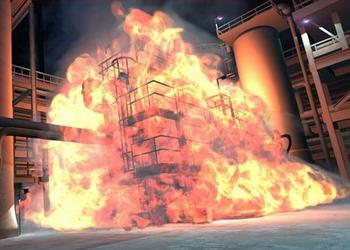
SEATTLE, Washington, January 30, 2014 (ENS) – The April 2010 fatal explosion and fire at the Tesoro refinery in Anacortes, Washington was caused by damage to the heat exchanger; the severely cracked and weakened carbon steel tubing then ruptured, killing seven workers, finds a draft report released Wednesday by the U.S. Chemical Safety Board.
The CSB investigation concludes that the accident at Tesoro could have been prevented had the company replaced the vulnerable carbon steel heat exchangers with inherently safer alloys that were already well known within the industry, but not required.

“Seven lives were tragically lost at the Tesoro refinery in 2010,” said CSB Chairman Dr. Rafael Moure-Eraso. “I believe the draft report does an outstanding job of tracing this complex accident to its roots: a deficient refinery safety culture, weak industry standards for safeguarding equipment, and a regulatory system that too often emphasizes activities rather than outcomes. The report is a clarion call for refinery safety reform.”
The CSB draft report makes far-reaching recommendations to the U.S. Environmental Protection Agency and the Washington Governor and Washington State Legislature to more rigorously protect workers and communities from potentially catastrophic chemical releases.
“This accident is very similar to the one that occurred at the Chevron refinery in Richmond, California in August 2012, where corrosion of piping went undetected for decades until it ruptured, endangering the lives of 19 workers caught in a vapor cloud and sending 15,000 community members to the hospital,” said Moure-Eraso. “Companies must do a better job of preventing refinery accidents, which occur all too frequently.”
Moure-Eraso said, “We need a national mandate for state and federal regulators to require chemical facilities utilize inherently safer technology to the greatest extent practicable. For example, storing or utilizing less hazardous materials, making the process safer by lowering temperatures and pressures, and installing the most reliable equipment available are critical to lowering the industry’s accident rate.”
The report stresses that the accident occurred during a startup of the naphtha hydrotreater unit, considered hazardous non-routine work, particularly due to the reoccurring leaks of flammable liquid.
Despite this, required Process Hazard Analyses at the refinery repeatedly failed to ensure that these hazards were controlled and that the number of workers exposed to these hazards was minimized.
Past Process Hazard Analyses, including those done by the preceding owner, Shell Anacortes Refining Company, cited only judgment-based safeguards and did not verify whether safeguards listed in the PHAs were actually effective.
The Chemical Safety Board today released a new computer animation recreating the Tesoro explosion and fire. The five-minute animation illustrates the process of “high temperature hydrogen attack,” which over the years damaged and weakened the 40-year-old carbon steel heat exchanger, leading to a catastrophic rupture on the night of the accident.
The animation explains that the seven workers present on the night of the accident were assisting with start up of the heat exchangers. They were mitigating recurring leaks never adequately addressed by Tesoro and manually opening a series of long-winded valves that required over 100 turns by hand to fully open.
Using sophisticated computer models, the investigation found the industry-wide method used to predict the risk of HTHA damage to be inaccurate, with equipment failures occurring under conditions the deemed to be safe from HTHA. It cited deficiencies in the company’s safety culture that led to a “complacent” attitude toward flammable leaks and occasional fires.
The draft report states that recommended practices of the American Petroleum Institute, an industry association, are written “permissively” with no minimum requirements to prevent HTHA failures.
The draft report is available at www.csb.gov for public comment until Sunday, March 16, 2014. Comments should be sent to tesorocomments@csb.gov. All comments received will be reviewed and published on the CSB website.
The Board does not issue citations or fines but does make safety recommendations to plants, industry organizations, labor groups, and regulatory agencies.
Tesoro, based in San Antonio, Texas, is one of the largest independent refiners and marketers of petroleum products in the United States, owns and operates the Anacortes refinery. It supplies gasoline, jet fuel and diesel fuel to markets in Washington and Oregon, and manufactures heavy fuel oils, liquefied petroleum gas and asphalt.
Copyright Environment News Service (ENS) 2014. All rights reserved.
© 2014, Environment News Service. All rights reserved. Content may be quoted only with proper attribution and a direct link to the original article. Full reproduction is prohibited.
